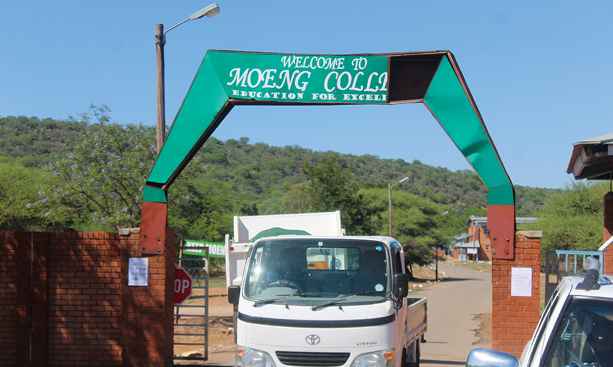With a few weeks left before the commencement of Agriculture pathway at Moeng college, the Ministry of Basic Education Department of curriculum development & Evaluation held an Agriculture Syllabus pre-implementation workshop from the 11-15th in Palapye to familiarize stakeholders with the subjects syllabi and their guide, and to train the teachers to ensure common interpretation and understanding of the syllabi contents prior to their implementation.
Speaking during the workshop, Palapye Sub- region Chief education Officer, Didimalang Mmemo indicated that the new curriculum has adopted a top down approach in content development that starts from senior level, through junior, primary and lastly pre-school level and it provides for two year education pathways, academic and vocation.
“The Agriculture syllabi (field crop production, Animal production and horticulture) are in vocational pathway, this pathway addresses the plight of contemporary human resource development approaches that delve into improvement of skills for the job market,” she said.
Mmemo further mentioned that the vocational pathway is constituted by a vocational stream, fundamentals and electives. “All learners will do the fundamental subjects English, Setswana, either Mathematics I or Mathematics II, and Life skills education irrespective of the pathway they pursue, core subjects (subjects that define the learning pathway) and electives (subjects that support the pathways and that learners choose to enrich their learning and future prospects),” she explained.
Furthermore Mmemo said the development process of the Outcome Based Education (OBE) syllabi has been a challenge to the ministry in that more resources had to be injected into the project to make it a success. “The process started with the Design phase where an empirical and judgmental process of identifying human needs and establishing priorities among them was done. This was followed by the development phase which is where a catalogue of all intended changes and innovations in a subject/ learning area are carried out over a period of time,” she said. “The next phase is implementation which is actually rolling out enmass or in phases of syllabuses depending on availability of resources,” she added.
She said the ministry had adopted a phase-in approach for the implantation of the Botswana Senior Secondary Education (BSSE) programme. “The ministry’s strategy is to introduce the new curriculum at Maun SSS and Moeng College this year then extend the implementation to more schools over time, this strategy has the advantage of building both grassroots interest in the curriculum and a cadre of experience teachers who can serve as resources to their colleagues in their schools,” she said.
She further said the school by school adoption approach also allows for development of a supportive culture for the implantation within each school and will also further enable the ministry to monitor syllabi implementation within the two years of senior secondary school. “The roll out to other schools will be in 2023, eighteen (18) phase II subjects will be implemented in 2022 while the remaining sixteen (16) phase III subjects will be in 2023. The education pathways system will effect only when a wholesome curriculum is in schools (all subjects),” she clarified. “It is imperative to ensure school preparedness for phase I subjects prior to syllabi rollout, hence our presence here,” she added.
Additionally, during his presentation, Botswana Examination Council Project Development Officer, who is also currently responsible for Outcome development Assessment Project Tatlhego Bolaane indicated that Outcome Based Education is the education theory that bases each part of an education system around goals/ outcomes. He reminded the participants especially the teachers that whenever they are doing assessment they should have in mind the principles of assessment. “It must reliable, it must be valid, it must be fair and so on, at the end of the day when the learner exit the programme, you as a teacher when you say that this learner can be able to demonstrate one, two, three, you must be saying that with confidence having observed the learner over a period of two years,” he said.
Bolaane further said BEC will grade the learners by using both marks from the provider/ teachers and the scores of the final examination. “In this case for all the three Agricultural subjects the final grade will be a contribution of what is obtained from the provider and what is obtained from the examination,” he said.
Moreover Bolaane warned that one of the key issues which they are currently struggling with is the authenticity of the learners work. He asked the teachers in attendance that when it comes to authenticity they must try level best to allow the learners to develop the skills, to work their own, not just to push their marks such that they achieve high grade. “It is not about making the learners to pass or to obtain high marks but rather to achieve the outcome so that when they go out of the programme you must be sure that what you are saying they are able to do, they can do that, it will be very irrelevant for us to have a learner achieving very high scores and when they are checked of what you said they can do you realize they don’t have the skills completely,” he said. “Let’s make the learners achieve the outcomes,” added Bolaane.
